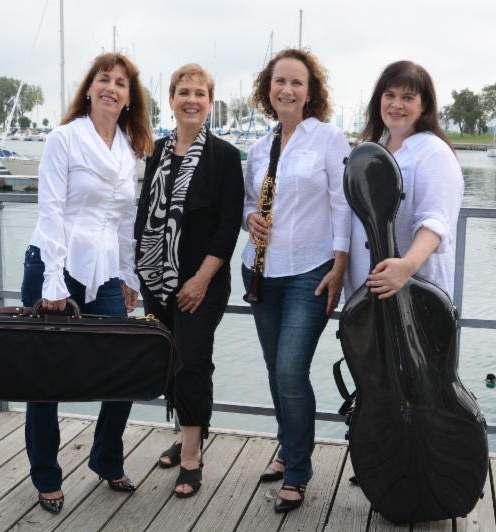Orion Ensemble serves up chamber rarities and a world premiere
“Old Meets New” was the title of the Orion Ensemble’s Wednesday night program at PianoForte Studios. And while the old was not so old by most chamber music standards (premiered in 1883), those works fared best during the evening.
The concert opened with the String Trio by the little-known Czech composer Gideon Klein. Klein was not so much forgotten by history as expunged from it. He died in 1945 at the age of 25, in the Fürstengrube subcamp of Auschwitz. The trio was his last completed work before his deportation there.
No doubt influenced by Klein’s tragic biography, the program notes (by Orion’s resident music historian Jim Kendros) describe the piece with words like “urgent,” “tortured,” and “agitated.” But little of this is audible in the music, most of which is written in a spiky, witty, almost Neoclassical style, as if in defiance of Klein’s circumstances.
The performance—by Orion violinist Florentina Ramniceanu and cellist Judy Stone, joined by frequent guest violist Stephen Boe—added little to reinforce the idea that this is tragic music. Theirs was a very cool, detached interpretation—even for the potentially poignant solo given to Stone at the first movement’s close. Until the third movement, there was barely a single strong accent to add vigor to the rhythms.
The players brought much more intensity to the world premiere of Sebastian Huydts’ Quintet for clarinet, violin, viola, cello, and piano. For this Orion commission they were joined by the other group members, clarinetist Kathryne Pirtle and pianist Diana Schmück.
Spanning about 30 minutes, Huydts’s Quintet is inspired by the Dutch novel Out of Mind by J. Bernlef, which describes a WWII survivor who begins to succumb to Alzheimer’s. The intelligence of Huydts’s craftsmanship was consistently on display, in his finely modulated voicings and patiently unfolding forms. And the players brought unflagging commitment to the music.
In his introduction Huydts explained that he represented the protagonist’s failing memory by weaving a tapestry of themes that are fragmented and blurred throughout, as if recollected dimly. The problem is Huydts’ themes are not particularly memorable. As such, it is difficult to recognize them and follow their various manipulations throughout the three movements, and thus absorb the effect that he clearly desired.
After intermission Pirtle, Boe, and Schmück played three excerpts from Bruch’s Eight Pieces for clarinet, viola, and piano.
This music is cast in Bruch’s most forthrightly tuneful (and sentimental) style. Boe adapted well to the change in idiom, replacing his drier tone from earlier with a hyper-romantic approach, with generous portions of vibrato. While Schmück had to spend much of the piece rippling in the background, she played her few big solos—in No. 6, a nocturne—with a meaty, expressive tone.
Boe’s firm shaping of his lines contrasted greatly with Pirtle’s characteristically sleek, fluid phrasing of her part. These approaches could have clashed, but they didn’t. Instead, they made each instrument seem like a genuine character in a dialogue. And Boe and Pirtle melded well when they had to share the melody.
Gabriel Fauré’s justly popular Piano Quartet No. 1 in C minor ended the program, with all the musicians in sparkling form.
The scherzo was a highlight with Schmück’s frisky way with the opening theme a joy. Throughout the quartet, the strings have few extended solos, mostly working as a team or trading short phrases. As in the Bruch, these trades were studies in contrasts rather than in blending, as Ramniceanu’s tart tone bounced off of Stone’s robust sound, particularly effective in the finale.
In keeping with their tradition, the Orion Ensemble invited a group of young musicians to perform on Wednesday night’s program. In this case, the Chicago Youth Symphony Orchestras Wind Quintet, played Leo J. Kauffman’s sprightly Wind Quintet to open the second half of the program.
This young quintet was, without reservation, excellent. Ensemble coordination and tuning were solid; articulation was playful, and dynamics well varied.
The Orion Ensemble will repeat the program 7:30 p.m. Sunday at the Music Institute of Chicago in Evanston. orionensemble.org
Posted in Performances


